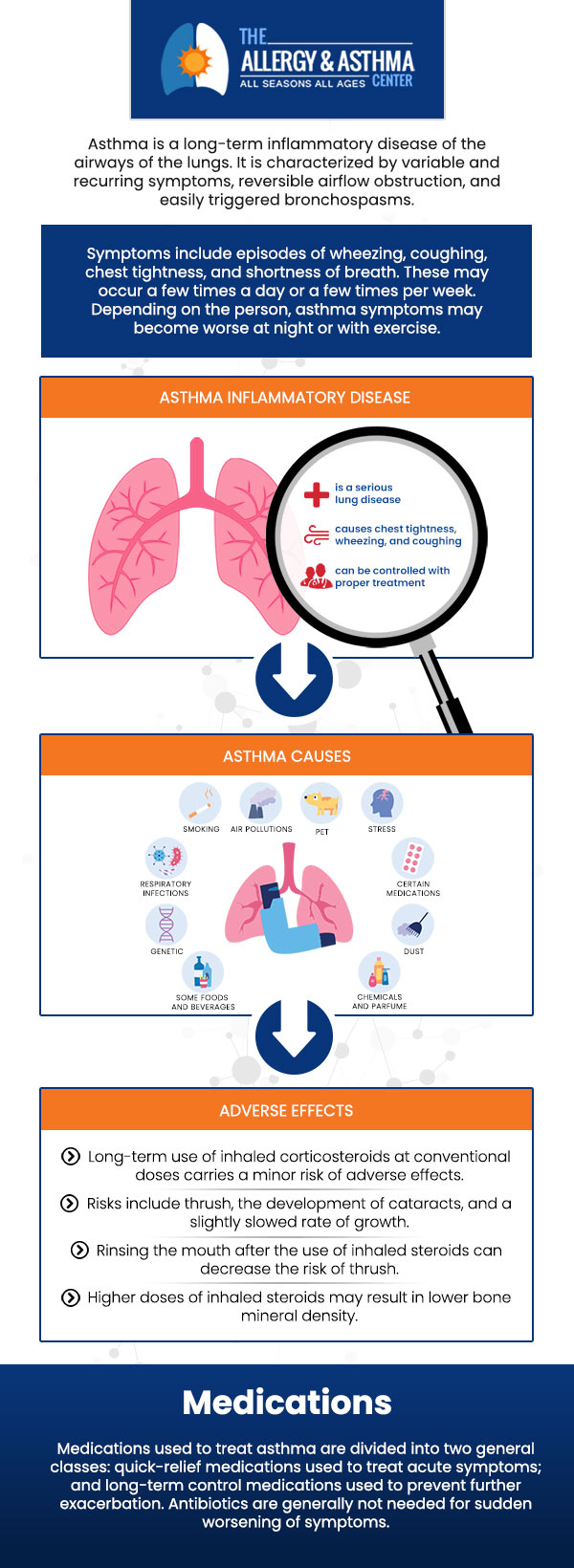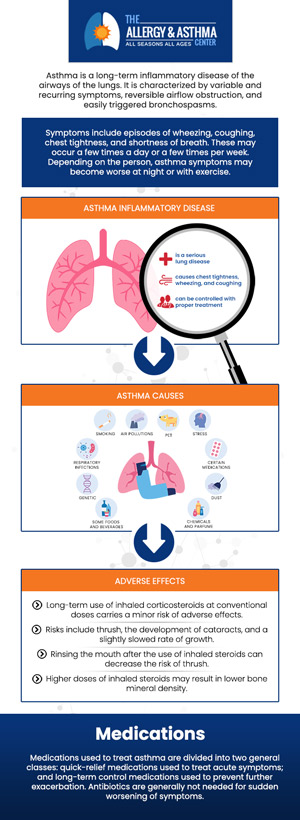COVID-19 and Asthma Questions and Answers
If you have questions about how COVID-19 affects asthma, read our below Q and A page. For more information, please contact us or book an appointment online. We serve patients from Lawrenceville GA, Atlanta GA, Conyers GA, Suwanee GA, Duluth GA, Grayson GA, Decatur GA, Brookhaven GA, Lithonia GA and Covington GA.




Table of Contents:
Are asthmatics at a higher risk for COVID-19?
What precautions should I take about COVID-19 if I have asthma?
Could an asthma nebulizer spread COVID-19?
Are any changes recommended to the asthma treatment plan of a patient with asthma who has COVID-19?
COVID-19 and asthma can have similar symptoms, and telling them apart can sometimes be a challenge. COVID-19 is known to cause severe symptoms in people with underlying health conditions. Therefore, someone with severe asthma can have more serious symptoms than someone who doesn’t.
The COVID-19 pandemic is scary for most people, but those with asthma may fear that their condition will cause a worse outcome or be more likely to contract the virus. It is important to know that currently there is no evidence that people with asthma have an increased infection rate. The CDC(Centers for Disease Control and Prevention) states that patients with moderate to severe asthma could be at greater risk for more severe disease. Many studies have been performed looking at the relationship between COVID-19 and asthma. At this time, the vast majority of the studies performed have found no relation between an increased risk of COVID-19 disease severity in people living with asthma. Further, there appears that asthma is not a contributing risk factor for developing COVID-19 disease.
However, a few studies indicate that non-allergic asthma may be associated with more severe COVID-19 disease. It is also important to note that these studies did not indicate if the subjects also had chronic obstructive pulmonary disease (COPD), which is a well-established risk for severe COVID-19. In conclusion of the current data, it appears that people with asthma have either no greater risk or a very slight risk for developing more severe COVID-19 disease. However, in cases of moderate to severe asthma or when it is not well-managed, the risk for developing more severe symptoms increases. This is different to other risk factors like obesity and COPD that have consistently been linked to more severe COVID-19 disease.
People with asthma should take the same precautionary measures as normal, with a few additions. The steps that help protect from COVID-19 are the same steps you take to avoid the flu and other respiratory infections:
– Wash your hands frequently with warm water and soap for 20 to 30 seconds
– Always wash your hands after coughing or sneezing. If there is no access to running water, use at least a 60% ethyl alcohol-based hand cleanser or 70% isopropyl alcohol (isopropanol)
– Don’t touch your eyes, nose or mouth
– Avoid contact with people who are sick or anyone who has been in contact with an infected individual
– Don’t share eating utensils, dishes, straws, food or makeup
– Wear a face covering
– Take your daily asthma medicines
– Avoid touching the mouthpiece of your inhaler
If you are sick, using a nebulizer can increase the risk of sending infected particles into the air. If possible, use an inhaler with a spacer if you need to take quick-relief medicine for an asthma episode. It is okay to use a nebulizer and solution to treat an asthma episode. When using a nebulizer, use it in a room by yourself or limit the number of people in the room.
Not treating asthma symptoms when needed at home is the biggest risk to people with asthma. This can lead to visits to emergency rooms with no hospital beds due to overcapacity. Uncontrolled asthma poses a greater risk to your health than COVID-19, so it is important to be prepared when living with asthma.
No, the ongoing coronavirus (COVID-19) pandemic does not require any changes to normal asthma control practices. So that people with asthma do not need to over rely on reliever medications, it is recommended to be on a daily controller medication.
If you or someone you know has asthma and is concerned about COVID-19, come to Allergy & Asthma Center today. Our kind and compassionate professionals are experienced in treating asthma and complications with COVID-19 and can provide you with a higher level of care. For more information on COVID-19 and asthma, call our office and get in touch with a member of our specialist team. To book an appointment with our asthma specialist, visit our website or speak with us over the phone today.

Additional Allergy & Asthma Services
▸ Allergy Shots
▸ Allergy Testing
▸ Asthma
▸ Bronchodilators
▸ Drug Allergy
▸ Food Allergy
▸ Insect Allergy
▸ Nasal/Sinus Allergies
▸ Pediatric Allergy
▸ Pediatric Asthma
▸ Skin Allergy
▸ Spring Allergies




